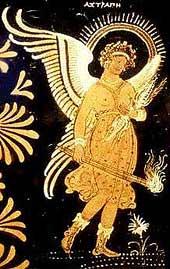Pridie Idus September

Modern Date : September 12th
Pridie Idus September
The Ludi Romani
This is one of the dies fasti on which legal actions are permitted.
The Ludi Romani, the great games in honor of Jupiter (Jove) continued this day and were celebrated through to the 19th.
September is the 'magical' seventh month (after March).
Astraea's Day
The Greeks called this Astraea's Day. Astraea ("the star-maiden") is the daughter of Zeus and Themis. Astraea was, as was her mother, a goddess of justice, who had the power to bestow wealth, victory, wisdom, and good luck. During the Golden Age, she wandered the earth and gave her blessings on humans but when evil and wickedness increased its grip on humanity, the gods abandoned the habitations of mankind. Astraea was the last to leave and took up her abode among the stars where she was transformed into the constellation Virgo.
Spenta Armaiti
In the Zoroastrian calendar, days of the annual Earth Festival honoring Spenta Armaiti, who created Earth in harmony with Ahura Mazda, the supreme deity who manifests in seven male and seven female emanations (yet another instance of the number 14, equal to half the days in a full lunar cycle). As in all Zoroastrian festivals, honors the Divine Fire in all its aspects, from the illumination of sacred wisdom to the cleansing and purifying fire that destroys illusion and the residues of unkind action.
Most Holy Name of Mary
This day is a Catholic feast day commemorating a victory in the name of Mary against the Turks in 1683. The feast originated in Spain and was approved by the Pope in 1513; Pope Innocent XI extended its observance to the whole Church in 1683 in thanksgiving for the victory on September 12, 1683 by John Sobieski, King of Poland, over the Turks, who were besieging Vienna and threatening the West. This day was commemorated in Vienna by creating a new kind of pastry and shaping it in the form of the Turkish half-moon. It was eaten along with coffee which was part of the booty from the Turks. This is the origin of the now infamous croissant.

0 Comments:
Post a Comment
<< Home